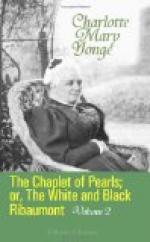He then held himself aloof, knowing that it was not well for her health, mental or bodily, to talk any more, and a good deal perplexed himself by the moods of his strange little impetuous convert, if convert she could be termed. He himself was a deeply learned scholar, who had studied all the bearings of the controversy; and, though bound to the French Reformers who would gladly have come to terms with the Catholics at the Conference of Plassy, and regretted the more decided Calvinism that his party had since professed, and in which the Day of St. Bartholomew confirmed them. He had a strong sense of the grievous losses they suffered by their disunion from the Church. The Reformed were less and less what his ardent youthful hopes had trusted to see them; and in his old age he was a sorrow-stricken man, as much for the cause of religion as for personal bereavements. He had little desire to win proselytes, but rather laid his hand to build up true religion where he found it suffering shocks in these unsettled, neglected times; and his present wish was rather to form and guide this little willful warm-hearted mother—whom he could not help regarding with as much affection as pity—to find a home in the Church that had been her husband’s, than to gain her to his own party. And most assuredly he would never let her involve herself, as she was ready to do, in the civil war, without even knowing the doctrine which grave and earnest men had preferred to their loyalty.
He could hear her murmuring to her baby, ’No, no, little one, we are not fallen so low as to beg our bread among strangers.’ To live upon her own vassals had seemed to her only claiming her just rights, but it galled her to think of being beholden to stranger Huguenots; and England and her mother-in-law, without Berenger, were utterly foreign and distasteful to her.
Her mood was variable. Messages from Blaise and Martin came and went, and it became known that her intended shelter at Chollet, together with all the adjacent houses, had been closely searched by the younger Ribaumont in conjunction with the governor; so that it was plain that some treachery must exist, and that she only owed her present freedom to her detention in the ruined temple; and it would be necessary to leave that as soon as it was possible for her to attempt the journey.
The plan that seemed most feasible to the vassals was, that Rotrou should convey her in a cart of fagots as far as possible on the road to Paris; that there his men should meet her by different roads, riding their farm-horses—and Martin even hoped to be able to convey her own palfrey to her from the monastery stable, and thence, taking a long stretch across country, they trusted to be able to reach the lands of a dependant of the house of Montmorency, who would not readily yield her up to a Guise’s man. But, whether instigated by Perrine, or by their own judgment, the vassals declared that, though Madame should be conducted wherever she desired, it was impossible to encumber themselves with the infant. Concealment would be impossible; rough, hasty rides would be retarded, her difficulties would be tenfold increased, and the little one would become a means of tracing her. There was no choice but to leave it with Simonette.




